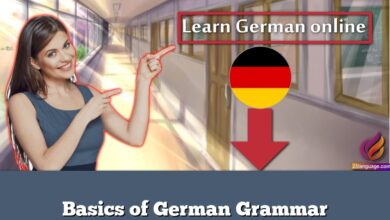You are using an outdated browser. Please upgrade your browser or activate Google Chrome Frame to improve your experience.

24 German Essay Phrases, Plus Tips on How to Write an Essay in German
We need to talk about your German essays.
Essay writing is a skill that you can learn in any language.
All you need is to brush up your vocabulary and follow a few simple strategies, and you’ll be well on your way to writing your first masterpiece.
This post will provide you with a list of useful German words and phrases to include in your next essay, plus the different types of German essays, a few writing strategies and even a sample essay at the end.
German Essay Phrases
General explaining, ordering facts and ideas, demonstrating contrast, expressing your opinion, summarizing and concluding, what are german essays like, the different types of german essays, how to write an essay in german in 4 steps, 1. write down a list of words , 2. do your research, 3. make an outline using transition words, 4. write directly in german, an example of a german essay, and one more thing....
Download: This blog post is available as a convenient and portable PDF that you can take anywhere. Click here to get a copy. (Download)
Let’s start with the words and phrases themselves. As you’ll see, they’re grouped according to how and when you’ll use them. Let’s start off with some that will help you explain your arguments.
1. Weil (Because)
Daniel muss lernen, weil er morgen einen Test hat.
(Daniel has to study because he has a test tomorrow.)
2. Da (Because)
Daniel muss lernen, da er morgen einen Test hat.
3. Denn (Because)
Daniel muss lernen, denn er hat morgen einen Test.
(Daniel has to study because tomorrow he has a test.)
A quick note: Weil, da and denn are generally interchangeable. Keep in mind though that denn requires a different word order.
4. Damit (In order to; So that)
Lisa lernt viel, damit sie den Test besteht.
(Lisa is studying a lot in order to pass the test.)
5. Um (To; In order to)
Lisa lernt viel, um den Test zu bestehen.
(Lisa is studying a lot to pass the test.)
6. Im Grunde (Basically; Fundamentally)
Im Grunde ist Deutsch keine schwierige Sprache.
(Fundamentally, German is not a difficult language.)
7. Eigentlich (Actually)
Eigentlich ist Deutsch nicht so schwierig, wie es scheint.
(Actually, German is not as difficult as it seems.)
8. Ein Beispiel anführen (To give an example)
Ich möchte ein Beispiel anführen .
(I would like to give an example.)
9. Dieses Beispiel zeigt, dass… (This example shows that…)
Dieses Beispiel zeigt, dass das Lernen einer Fremdsprache beim Reisen viele Vorteile hat.
(This example shows that studying a foreign language has many advantages when traveling.)
10. Erstens… zweitens… (Firstly… secondly…)
Erstens kann man sich auf Reisen besser verständigen und zweitens lernt man viele neue Leute kennen.
(Firstly, you can communicate better while traveling, and secondly, you meet many new people.)
11. Das Wichtigste ist… (T he most important thing is…)
Das Wichtigste ist , die Angst vor der Sprache zu verlieren.
(The most important thing is to lose your fear of the language.)
12. Außer dem (Furthermore)
Außerdem kann man beim Reisen seine Sprachkenntnisse verbessern.
(Furthermore, you can improve your language knowledge while traveling.)
13. Nicht nur… sondern auch… (Not only… but also…)
Nicht nur im Unterricht, sondern auch im Alltag kann man viel Deutsch lernen.
(Not only in class, but also in everyday life you can learn a lot of German.)
14. Obwohl (Even though)
Obwohl Anna viel lernt, hat sie Probleme mit der deutschen Grammatik.
(Even though Anna studies a lot, she has problems with German grammar.)
15. Allerdings (However)
Anna lernt gerne Deutsch, allerdings hat sie Probleme mit der Grammatik.
(Anna enjoys studying German; however, she has problems with the grammar.)
16. Trotz (Despite)
Trotz ihrer Probleme mit der Grammatik lernt Anna gerne Deutsch.
(Despite her problems with German grammar, Anna enjoys studying German.)
17. Im Vergleich zu (In comparison to)
Im Vergleich zu Russisch ist Deutsch eine einfache Sprache.
In comparison to Russian, German is an easy language.
18. Im Gegensatz zu (In contrast to; Unlike)
Im Gegensatz zu Anna lernt Paul gerne neue Vokabeln.
Unlike Anna, Paul enjoys learning new vocabulary.
19. Meiner Meinung nach (In my opinion)
Meiner Meinung nach sollte jeder eine Fremdsprache lernen.
(In my opinion, everybody should study a foreign language.)
20. Ich bin der Ansicht, dass… (I believe that…)
Ich bin der Ansicht, dass jeder eine Fremdsprache lernen sollte.
(I believe that everybody should study a foreign language.)
21. Ich finde es schade, dass… (I think it’s a pity that…)
Ich finde es schade, dass die Schulen keine anderen Fremdsprachen unterrichten.
(I think it’s a pity that schools don’t teach other foreign languages.)
22. Alles in Allem (Overall)
Alles in allem ist Deutsch nicht so schwierig, wie es scheint.
(Overall, German isn’t as difficult as it seems.)
23. Im Großen und Ganzen (Overall)
Im Großen und Ganzen ist Deutsch keine schwierige Sprache.
(Overall, German isn’t a difficult language.)
24. Zusammenfassend kann man sagen, dass… (In summary, it can be said that…)
Zusammenfassend kann man sagen, dass Sprachen beim Reisen sehr hilfreich sein können.
(In summary, it can be said that languages can be very helpful when traveling.)
Ok, let’s get a little deeper into the actual essays themselves. How do they compare to the essays that you’re probably used to writing?
- They have a similar structure to English essays. Remember how English essays have a beginning, middle and end? Good news: German essays contain those same parts. When you’re writing a German essay, you’ll want to include an opening paragraph with your argument, three supporting paragraphs that further your argument and a conclusion. German and English are often surprisingly similar, and essay structure is no exception.
- German essays are more to the point. Although German essays and English essays are structured similarly, German essays—just like German speakers—tend to be more blunt and to the point. You won’t need to dance around your conclusions or obfuscate in German: just say what you mean.
- German punctuation is different. Germans have different rules for punctuation than English speakers. For example, Germans introduce a direct quote with a colon instead of a comma. They use quotes instead of italics for the names of books, movies and newspapers. And they set off relative clauses beginning with dass (that) with a comma, unlike in American English. Understanding these differences between English and German punctuation will ensure you don’t give yourself away as a non-native speaker through punctuation marks alone!
Before you get started on your essay, make sure you know what type of essay you’re going to write. If it’s a school essay, be sure to read and understand the instructions.
Here are a few notes about the most common kinds of essays in German.
- An Erzählung is a narrative essay that tells a story. Your teacher might give you some keywords or pictures and ask you to create a story around it. An Erlebniserzählung (“experience story”) is about a personal experience and can be written in the first person.
- An Erörterung is an argumentative essay, a writing piece meant to persuade someone to think the way you do. This writing genre requires you to investigate your topic well and provide evidence to prove your point.
- In a Nacherzählung you summarize and recount a book, a film or an article you have read, from an objective perspective. Depending on the essay instructions, you might be asked for your personal opinion in the conclusion.
Are you ready to start writing? Use these four strategies to wow your teachers and write the perfect German essay.
You should look at any new activity as an opportunity to learn and master new vocabulary . Instead of using the same words that you use in your everyday German speech, use this essay as an opportunity to introduce new words into your German lexicon.
Besides, incorporating academic words that help you craft and shape your argument can make your essay sound more professional and polished. So before you start writing, write down a list of the German words you’d like to incorporate in your essay.
As with everything else, you should look at the research portion of the essay-writing process as an opportunity to learn more about Germany—this time, about German culture, history , politics or travel .
Chances are if you’re writing your essay for a language-learning class, you’ll be assigned a topic pertaining to one of these aspects of German life, so use this as a chance to learn more about Deutschland.
For example, Deutsche Welle offers information and resources about German history. Other newspapers such as Berliner Zeitung and Frankfurter Allgemeine Zeitung offer another perspective on politics and daily life in Germany.
There’s nothing clunkier than an essay that doesn’t flow naturally from one point to the next. Besides, thinking about how your arguments and points interact with each other will help you organize your essay and make sure you get your point across. (Do they support each other? Counter each other? How exactly do they function to further your argument?)
Examples of transition words:
- Vorher (prior)
- zur gleichen Zeit (at the same time)
- dann (then)
- trotzdem (nevertheless)
- noch (still)
Writing an essay in English and then translating it into German often results in stilted, poorly formed sentences and unnatural constructions.
For example, remember that German word order is different from English. If you write “He didn’t read the book,” a one-to-one literal translation would be Er hat gelesen nicht das Buch . But the correct translation is actually Er hat nicht das Buch gelesen. In this example, translating word for word leads to errors.
There’s another, less tangible reason why it’s not a good idea to write in English and translate to German. Sure, you could just remember that you need to change the word order when translating into German. But isn’t it better to adapt your brain so that German word order seems fluid and natural?
Learning to think and write off-the-cuff in German is an essential step towards fluency, and devising sentences in German, instead of sentences in translation, will help you learn to do that.
One good way to learn to think in a language is to hear it spoken in natural contexts. You can hear German spoken naturally in German language TV shows , movies and YouTube videos .
Listening to German spoken at a natural speed and native accent will help get you thinking in the language in real time. This will help get you to the point where you can come up with your own sentences in German, rather than thinking in English sentences first and then translating them in your head before you speak or write. That will greatly improve your speed and fluency when writing in German.
So, simply start writing the essay in German. Look up any words you’re not sure of and double-check any grammatical constructions that you’re not familiar with. After you finish writing, ask a German-speaking friend to look over the essay to make sure it sounds natural.
Now that we’ve explored strategies and phrases for writing top-notch German essays, let’s take a look at an example.
World War I doesn’t get as much coverage in the States as World War II (where it was more directly involved). But for Europe, World War I was a devastating example of the dangers of modern technological warfare and the horrors of violence.
Let’s take a look at an example opening paragraph and outline of an essay about the effect of World War I on German government and life.
Opening paragraph:
Der Erste Weltkrieg war ein totaler Krieg, der Deutschland völlig veränderte. Dieser Krieg hat 1914 angefangen, und 1918, als der Krieg zu Ende kam, waren die deutsche Gesellschaft, Regierung und Kultur nicht mehr erkennbar. Am Anfang hat der Erste Weltkrieg altväterliche Ideen und Systeme verstärkt. Am Ende hat dieser Krieg dagegen diese altväterlichen Dinge zerstört.
(The First World War was a total war that completely changed Germany. This war began in 1914 and in 1918, when the war came to an end, German society, government and culture were no longer recognizable. At the beginning, the First World War strengthened old-fashioned ideas and systems. However, by the end, this war destroyed these old-fashioned things.)
Notice that this opening paragraph is not very different at all from the first paragraph of an English essay. You can use the same structure you’ve always used to write your German essay, leaving you free to focus on grammar and vocabulary.
Notice also the use of phrases such as Am Anfang (at the beginning) and Dagegen (however). Words like these can help you make a point and counterpoint in your opening paragraph (or anywhere in your essay, for that matter).
I. Am Anfang (at the beginning):
– Dieser Krieg hat Deutschland vereint . (This war united Germany.) – Menschen hatten ein patriotisches Gefühl. (People had a patriotic feeling.) – Menschen dachten, dass der Krieg bald zu Ende kommen würde. (People thought that the war would soon come to an end.)
Notice that these points employ words like dachten (thought). Written German often relies on Präteritum , a form of the past tense that’s rarely used in spoken Deutsch. It’s often called “literary past tense” for this reason. Check out this guide to the Präteritum to include this tense in your essay.
II. Andrerseits (on the other hand):
– Bald gab es kein Essen mehr . (Soon there was no more food.) – Menschen wurden krank und desillusioniert . (People became sick and disillusioned.) – Es gab Proteste und Unruhen. (There was protest and unrest.)
Like in an English essay, your second and third paragraphs can include supporting points or counterpoints that contribute to the overall theme of your piece. The word Andrerseits (on the other hand) is an ideal transition word to show that you’re moving into another section of your essay.
Also notice that this essay will rely on vocabulary words that the average language learner might not have come across in his or her learning. After all, who learns the words for “disillusioned” and “unrest” in their intermediate German class? But don’t be daunted by the fact that your essay might include eclectic vocabulary. Instead, use this as an opportunity for more learning.
III. zum Schluss (in conclusion):
– Der Kaiser hat abgedankt . (The Emperor abdicated.) – Eine Republik wurde geboren. (A Republic was born.) – Die alten Werte waren weg. (The old values were gone.)
Once again, abgedankt (abdicated) is an example of the literary past tense (and an example of a word that you probably haven’t come across in your previous German studies!)
IV. Schließlich (finally)
– Der Erste Weltkrieg hat Deutschland verändert . (The First World War completely changed Germany.)
Again, like in an English essay, you should use this paragraph to summarize your main point.
Feeling a bit more confident about your next German essay now?
Just make a great essay plan, write down some new words and phrases that you want to include and off you go!
By sprinkling these bits of flair into your German essays, you’re sure to make your writing better and more effective.
Enjoy writing!
Want to know the key to learning German effectively?
It's using the right content and tools, like FluentU has to offer ! Browse hundreds of videos, take endless quizzes and master the German language faster than you've ever imagine!

Watching a fun video, but having trouble understanding it? FluentU brings native videos within reach with interactive subtitles.

You can tap on any word to look it up instantly. Every definition has examples that have been written to help you understand how the word is used. If you see an interesting word you don't know, you can add it to a vocabulary list.

And FluentU isn't just for watching videos. It's a complete platform for learning. It's designed to effectively teach you all the vocabulary from any video. Swipe left or right to see more examples of the word you're on.

The best part is that FluentU keeps track of the vocabulary that you're learning, and gives you extra practice with difficult words. It'll even remind you when it’s time to review what you’ve learned.
Start using the FluentU website on your computer or tablet or, better yet, download the FluentU app from the iTunes or Google Play store. Click here to take advantage of our current sale! (Expires at the end of this month.)
If you liked this post, something tells me that you'll love FluentU, the best way to learn German with real-world videos.
Experience German immersion online!
Enter your e-mail address to get your free PDF!
We hate SPAM and promise to keep your email address safe

- Application process for Germany VISA
- Germany Travel Health Insurance
- Passport Requirements
- Visa Photo Requirements
- Germany Visa Fees
- Do I need a Visa for short stays in Germany?
- How to Get Flight Itinerary and Hotel Booking for Visa Application
- Germany Airport Transit Visa
- Germany Business VISA
- Guest Scientist VISA
- Germany Job Seeker Visa
- Medical Treatment VISA
- Tourist & Visitor Visa
- Trade Fair & Exhibitions VISA
- Training or Internship VISA
- Study Visa for Germany
- Working (Employment) VISA
- German Pronunciation
- German Volabulary
- Requirements
- Health Insurance
- Trend & Living
- Free Assessment Form
- Privacy Policy
Easy German Essays for Beginners: 8 Examples to Practice Your Language Skills

Are you a beginner in learning German and looking for ways to practice your language skills? One great way to do so is by writing essays in German. Writing essays not only improves your grammar and vocabulary but also helps you express your thoughts and ideas in the target language. In this article, we will provide you with eight easy German essays for Beginners with English translation and vocabulary to help you get started.
- Meine Familie (My family) – Write about your family, including their names, occupations, and hobbies.
- Mein Haus (My house) – Describe your house or apartment, including the number of rooms, furniture, and decorations.
- Meine Hobbys (My hobbies) – Talk about your favorite hobbies, such as playing sports, reading books, or listening to music.
- Meine Schule (My school) – Write about your school, including its location, teachers, and subjects you study.
- Meine Freunde (My friends) – Discuss your friends, including how you met them, their personalities, and what you like to do together.
- Meine Stadt (My city) – Describe your city or town, including its population, tourist attractions, and cultural events.
- Meine Reise (My trip) – Write about a recent trip you took, including the destination, transportation, and activities you did there.
- Meine Lieblingsessen (My favorite food) – Talk about your favorite foods, including traditional German dishes and other international cuisines.
Remember to use simple vocabulary and sentence structures while writing the essays. Good luck with your German learning journey!
Table of Contents
Meine familie (my family).
Ich heiße Maria und ich möchte euch gerne meine Familie vorstellen. Wir sind insgesamt vier Personen in meiner Familie. Mein Vater heißt Klaus und er arbeitet als Ingenieur. Meine Mutter heißt Petra und sie ist Hausfrau. Mein Bruder heißt Jan und er geht noch zur Schule.
(My name is Maria, and I would like to introduce you to my family. We are a family of four. My father’s name is Klaus, and he works as an engineer. My mother’s name is Petra, and she is a homemaker. My brother’s name is Jan, and he still goes to school.)
Vocabulary:
- Ich heiße Maria (My name is Maria)
- insgesamt (altogether)
- vier Personen (four persons)
- der Vater (father)
- arbeiten (to work)
- der Ingenieur (engineer)
- die Mutter (mother)
- Hausfrau (homemaker)
- der Bruder (brother)
- noch zur Schule gehen (still go to school)
Mein Vater arbeitet in einem großen Unternehmen als Ingenieur. Er ist sehr fleißig und verbringt viel Zeit im Büro. In seiner Freizeit geht er gerne joggen oder spielt Golf. Meine Mutter kümmert sich um den Haushalt und verbringt viel Zeit damit, leckere Mahlzeiten zu kochen. Sie liest auch gerne Bücher und geht regelmäßig zum Yoga.
(My father works in a large company as an engineer. He is very hardworking and spends a lot of time in the office. In his free time, he likes to go jogging or play golf. My mother takes care of the household and spends a lot of time cooking delicious meals. She also likes to read books and regularly attends yoga classes.)
- in einem großen Unternehmen (in a large company)
- sehr fleißig (very hardworking)
- viel Zeit (a lot of time)
- im Büro (in the office)
- in seiner Freizeit (in his free time)
- joggen (to go jogging)
- Golf spielen (to play golf)
- sich kümmern um (to take care of)
- der Haushalt (household)
- leckere Mahlzeiten kochen (cook delicious meals)
- gerne lesen (like to read)
- regelmäßig (regularly)
- zum Yoga gehen (go to yoga)
Mein Bruder Jan geht noch zur Schule und ist sehr sportlich. Er spielt Fußball im Verein und geht regelmäßig ins Fitnessstudio. In seiner Freizeit hört er gerne Musik und schaut Filme.
(My brother Jan still goes to school and is very sporty. He plays soccer in a club and regularly goes to the gym. In his free time, he likes to listen to music and watch movies.)
- sehr sportlich (very sporty)
- Fußball spielen (to play soccer)
- im Verein (in a club)
- ins Fitnessstudio gehen (to go to the gym)
- Musik hören (listen to music)
- Filme schauen (watch movies)
Ich studiere im Moment an der Universität und meine Hobbys sind Lesen, Reisen und Yoga. In meiner Freizeit gehe ich gerne in die Natur und genieße die frische Luft.
(I am currently studying at the university, and my hobbies are reading, traveling, and yoga. In my free time, I like to go into nature and enjoy the fresh air.)
- studieren (to study)
- an der Universität (at the university)
- die Hobbys (hobbies)
- Lesen (reading)
- Reisen (traveling)
- Yoga (yoga)
- die Freizeit (free time)
- in die Natur gehen (go into nature)
- genießen (enjoy)
- frische Luft (fresh air)
Das ist meine Familie. Wir haben viele verschiedene Hobbys und Interessen, aber wir verbringen auch gerne gemeinsam Zeit miteinander.
(This is my family. We have many different hobbies and interests, but we also enjoy spending time together.)
- das ist (this is)
- verschiedene Hobbys und Interessen (different hobbies and interests)
- gerne Zeit miteinander verbringen (enjoy spending time together)
Top reasons why Berlin is the best city for Expats!
Mein Haus (My House)
Ich lebe in einem Haus mit drei Schlafzimmern und zwei Bädern. Das Haus ist zweistöckig und hat auch einen Keller. Im Erdgeschoss befinden sich das Wohnzimmer, die Küche und ein Esszimmer. Im Wohnzimmer haben wir ein bequemes Sofa und einen großen Fernseher. In der Küche gibt es eine Spülmaschine, einen Herd, einen Backofen und einen Kühlschrank. Das Esszimmer hat einen Esstisch mit sechs Stühlen.
(I live in a house with three bedrooms and two bathrooms. The house is two stories and also has a basement. On the ground floor, there is the living room, kitchen, and a dining room. In the living room, we have a comfortable sofa and a large television. In the kitchen, there is a dishwasher, stove, oven, and refrigerator. The dining room has a dining table with six chairs.)
- das Haus (house)
- die Schlafzimmer (bedrooms)
- die Bäder (bathrooms)
- zweistöckig (two-storied)
- der Keller (basement)
- das Erdgeschoss (ground floor)
- das Wohnzimmer (living room)
- die Küche (kitchen)
- das Esszimmer (dining room)
- ein bequemes Sofa (a comfortable sofa)
- ein großer Fernseher (a large television)
- eine Spülmaschine (a dishwasher)
- ein Herd (a stove)
- ein Backofen (an oven)
- ein Kühlschrank (a refrigerator)
- ein Esstisch (a dining table)
- sechs Stühle (six chairs)
Im Obergeschoss befinden sich die Schlafzimmer und die Bäder. Mein Schlafzimmer hat ein großes Bett, einen Schreibtisch und einen Kleiderschrank. Das Badezimmer hat eine Badewanne und eine Dusche. In den anderen Schlafzimmern gibt es auch Betten und Schränke für Kleidung.
(Upstairs, there are the bedrooms and bathrooms. My bedroom has a large bed, a desk, and a closet. The bathroom has a bathtub and a shower. In the other bedrooms, there are also beds and closets for clothes.)
- das Obergeschoss (upper floor)
- das Schlafzimmer (bedroom)
- der Schreibtisch (desk)
- der Kleiderschrank (closet)
- das Badezimmer (bathroom)
- die Badewanne (bathtub)
- die Dusche (shower)
- die anderen Schlafzimmer (the other bedrooms)
Im Keller haben wir eine Waschmaschine und einen Trockner. Wir nutzen den Keller auch als Lager für Dinge, die wir nicht oft brauchen.
(In the basement, we have a washing machine and dryer. We also use the basement as a storage area for things we don’t need often.)
- die Waschmaschine (washing machine)
- der Trockner (dryer)
- als Lager nutzen (use as storage area)
- Dinge (things)
Wir haben auch einige Dekorationen im Haus. Im Wohnzimmer haben wir ein großes Gemälde an der Wand und im Esszimmer steht eine Vase mit Blumen auf dem Tisch.
(We also have some decorations in the house. In the living room, we have a large painting on the wall, and in the dining room, there is a vase of flowers on the table.)
- die Dekorationen (decorations)
- das Gemälde (painting)
- die Wand (wall)
- die Vase (vase)
- die Blumen (flowers)
- der Tisch (table)
Wir haben auch ein paar Teppiche im Haus, um den Boden zu bedecken. Das Wohnzimmer hat einen braunen Teppich, während die Schlafzimmer jeweils einen unterschiedlichen Farbton haben. Mein Schlafzimmer hat einen blauen Teppich, während das andere Schlafzimmer einen roten Teppich hat.
(We also have some carpets in the house to cover the floor. The living room has a brown carpet, while the bedrooms have a different color tone each. My bedroom has a blue carpet, while the other bedroom has a red carpet.)
- der Teppich (carpet)
- den Boden bedecken (to cover the floor)
- unterschiedliche Farbton (different color tone)
Insgesamt bin ich sehr glücklich mit meinem Haus. Es ist gemütlich und hat genug Platz für meine Familie und mich.
(Overall, I am very happy with my house. It is cozy and has enough space for my family and me.)
- insgesamt (overall)
- glücklich (happy)
- gemütlich (cozy)
- genug Platz (enough space)
Difference between ein, eine, einen, and einem in the German Language
Meine hobbys (my hobbies).
Ich habe einige Hobbys, die ich sehr gerne mache. Eines meiner Lieblingshobbys ist es, Sport zu treiben. Insbesondere mag ich es, Basketball zu spielen und Laufen zu gehen. Ich liebe es, im Freien zu sein und Sport zu treiben, weil es mir hilft, mich fit und gesund zu halten.
(I have some hobbies that I really enjoy doing. One of my favorite hobbies is doing sports. In particular, I like to play basketball and go running. I love being outdoors and doing sports because it helps me stay fit and healthy.)
- das Hobby (hobby)
- Sport treiben (to do sports)
- Basketball spielen (to play basketball)
- Laufen gehen (to go running)
- im Freien sein (to be outdoors)
- fit und gesund (fit and healthy)
Ein weiteres Hobby von mir ist das Lesen von Büchern. Ich lese gerne Romane und Sachbücher, besonders über Geschichte und Wissenschaft. Lesen ist für mich eine Möglichkeit, zu lernen und meine Vorstellungskraft zu erweitern.
(Another hobby of mine is reading books. I enjoy reading novels and non-fiction books, especially about history and science. Reading is a way for me to learn and expand my imagination.)
- das Lesen (reading)
- das Buch (book)
- der Roman (novel)
- das Sachbuch (non-fiction book)
- die Geschichte (history)
- die Wissenschaft (science)
- die Vorstellungskraft (imagination)
Außerdem höre ich gerne Musik. Ich mag viele verschiedene Genres wie Pop, Rock und Klassik. Musik kann meine Stimmung beeinflussen und mich entspannen.
(Additionally, I like to listen to music. I enjoy many different genres like pop, rock, and classical. Music can influence my mood and help me relax.)
- die Musik (music)
- das Genre (genre)
- Pop, Rock, Klassik (pop, rock, classical)
- die Stimmung (mood)
- sich entspannen (to relax)
Insgesamt bin ich sehr dankbar für meine Hobbys. Sie helfen mir, meinen Geist und Körper gesund zu halten und mich zu entspannen.
(Overall, I am very grateful for my hobbies. They help me keep my mind and body healthy and help me relax.)
- dankbar (grateful)
- der Geist (mind)
- der Körper (body)
German Essays on My Family: Meine Familie
Meine schule (my school).
Ich besuche eine Schule in der Nähe meines Hauses. Die Schule ist relativ groß und hat viele Schülerinnen und Schüler. Wir haben viele Lehrerinnen und Lehrer, die alle sehr nett und hilfsbereit sind.
(I attend a school near my house. The school is relatively large and has many students. We have many teachers who are all very kind and helpful.)
- besuchen (to attend)
- die Nähe (proximity)
- relativ (relatively)
- die Schülerin (female student)
- der Schüler (male student)
- viele (many)
- die Lehrerin (female teacher)
- der Lehrer (male teacher)
- nett (kind)
- hilfsbereit (helpful)
Die Schule bietet viele verschiedene Fächer an, einschließlich Mathematik, Geschichte, Englisch, Naturwissenschaften und Fremdsprachen. Mein Lieblingsfach ist Englisch, weil ich gerne Geschichten lese und schreibe. Ich denke, dass es wichtig ist, eine gute Ausbildung zu haben, um im Leben erfolgreich zu sein.
(The school offers many different subjects, including mathematics, history, English, science, and foreign languages. My favorite subject is English because I enjoy reading and writing stories. I believe that having a good education is important to be successful in life.)
- das Fach (subject)
- einschließlich (including)
- Mathematik (mathematics)
- Geschichte (history)
- Englisch (English)
- Naturwissenschaften (science)
- Fremdsprachen (foreign languages)
- das Lieblingsfach (favorite subject)
- die Geschichte (story)
- die Ausbildung (education)
- erfolgreich (successful)
Unsere Schule hat auch viele außerschulische Aktivitäten, wie zum Beispiel Sportmannschaften und Musikgruppen. Ich bin Mitglied des Schulfußballteams und wir haben viele Spiele gegen andere Schulen in der Gegend. Es macht mir viel Spaß und ich habe viele Freunde durch das Team kennengelernt.
(Our school also has many extracurricular activities, such as sports teams and music groups. I am a member of the school soccer team and we have many games against other schools in the area. It’s a lot of fun and I have made many friends through the team.)
- außerschulisch (extracurricular)
- die Aktivitäten (activities)
- die Sportmannschaften (sports teams)
- die Musikgruppen (music groups)
- das Mitglied (member)
- das Schulfußballteam (school soccer team)
- das Spiel (game)
- die Gegend (area)
- der Spaß (fun)
- der Freund (friend)
Insgesamt bin ich sehr glücklich auf meiner Schule und ich denke, dass ich hier eine gute Ausbildung bekomme. Ich hoffe, dass ich in Zukunft noch mehr von den vielen Möglichkeiten, die die Schule bietet, profitieren kann.
(Overall, I am very happy at my school and I think that I am getting a good education here. I hope that in the future, I can take advantage of even more of the many opportunities that the school offers.)
- die Möglichkeit (opportunity)
- profitieren (to take advantage of)
List of German adjectives with English meaning
Meine Freunde (My friends)
Ich habe viele Freunde, aber ich möchte über meine drei engsten Freunde sprechen. Wir haben uns alle in der Grundschule kennengelernt und sind seitdem unzertrennlich.
(I have many friends, but I want to talk about my three closest friends. We all met in elementary school and have been inseparable ever since.)
- die Freunde (friends)
- unzertrennlich (inseparable)
Mein erster Freund heißt Max. Er ist sehr sportlich und spielt gerne Fußball und Basketball. Max ist auch sehr lustig und hat immer eine positive Einstellung. Wir lieben es, zusammen Sport zu treiben oder Videospiele zu spielen.
(My first friend is Max. He is very athletic and likes to play soccer and basketball. Max is also very funny and always has a positive attitude. We love to exercise or play video games together.)
- sportlich (athletic)
- Fußball (soccer)
- Basketball (basketball)
- die Einstellung (attitude)
- lustig (funny)
- zusammen (together)
- Videospiele (video games)
Meine Freundin Anna ist sehr künstlerisch und liebt es zu malen und zu zeichnen. Sie hat auch ein großes Herz und ist immer bereit, anderen zu helfen. Anna und ich machen oft zusammen Kunstprojekte oder gehen ins Kino.
(My friend Anna is very artistic and loves to paint and draw. She also has a big heart and is always willing to help others. Anna and I often do art projects together or go to the movies.)
- künstlerisch (artistic)
- malen (to paint)
- zeichnen (to draw)
- das Herz (heart)
- bereit (willing)
- helfen (to help)
- das Kunstprojekt (art project)
- ins Kino gehen (to go to the movies)
Mein Freund Tom ist sehr intelligent und liebt es, neue Dinge zu lernen. Er ist auch sehr abenteuerlustig und geht gerne auf Reisen. Tom und ich haben viele spannende Abenteuer erlebt, wie zum Beispiel Campingausflüge oder Klettertouren.
(My friend Tom is very smart and loves to learn new things. He is also very adventurous and likes to travel. Tom and I have had many exciting adventures, such as camping trips or climbing expeditions.)
- intelligent (smart)
- abenteuerlustig (adventurous)
- die Reise (travel)
- die Abenteuer (adventures)
- der Campingausflug (camping trip)
- die Klettertour (climbing expedition)
Insgesamt bin ich sehr dankbar für meine Freunde und bin froh, dass ich sie habe. Wir haben so viele schöne Erinnerungen zusammen gemacht und ich freue mich auf viele weitere Abenteuer mit ihnen.
(Overall, I am very grateful for my friends and am glad to have them. We have made so many beautiful memories together and I look forward to many more adventures with them.)
- froh (glad)
- die Erinnerungen (memories)
Meine Stadt (My city)
Ich lebe in einer Stadt namens Hamburg in Deutschland. Hamburg ist die zweitgrößte Stadt Deutschlands und hat eine Bevölkerung von etwa 1,8 Millionen Menschen. Es ist eine Hafenstadt und liegt an der Elbe.
(I live in a city called Hamburg in Germany. Hamburg is the second largest city in Germany and has a population of about 1.8 million people. It is a port city and located on the river Elbe.)
- die Bevölkerung (population)
- der Hafen (port)
- die Elbe (river Elbe)
Hamburg ist bekannt für seine vielen Touristenattraktionen. Eines der bekanntesten ist der Hamburger Hafen, der einer der größten Häfen Europas ist. Es gibt auch den Fischmarkt, auf dem man frischen Fisch kaufen und lokale Spezialitäten probieren kann.
(Hamburg is known for its many tourist attractions. One of the most famous is the Port of Hamburg, which is one of the largest ports in Europe. There is also the Fish Market, where you can buy fresh fish and try local specialties.)
- die Touristenattraktionen (tourist attractions)
- bekannt (known)
- der Fischmarkt (fish market)
- frisch (fresh)
- lokale Spezialitäten (local specialties)
Außerdem gibt es viele kulturelle Veranstaltungen in Hamburg. Jedes Jahr findet das Hamburger Domfest statt, das größte Volksfest im Norden Deutschlands. Es gibt auch das Internationale Filmfest Hamburg, bei dem Filme aus der ganzen Welt gezeigt werden.
(Additionally, there are many cultural events in Hamburg. Every year, the Hamburg Dom Festival takes place, which is the largest folk festival in northern Germany. There is also the Hamburg International Film Festival, where films from all over the world are shown.)
- kulturelle Veranstaltungen (cultural events)
- das Domfest (folk festival)
- das Internationale Filmfest (international film festival)
- aus der ganzen Welt (from all over the world)
Insgesamt ist Hamburg eine lebendige und vielfältige Stadt, die für jeden etwas zu bieten hat.
(Overall, Hamburg is a vibrant and diverse city that has something to offer for everyone.)
- lebendig (vibrant)
- vielfältig (diverse)
- etwas zu bieten haben (to have something to offer)
My trip (Meine Reise)
Ich bin vor Kurzem mit meiner Familie nach Paris gereist. Wir sind direkt von unserer Stadt aus geflogen und kamen früh am Morgen in Paris an.
(I recently went on a trip to Paris with my family. We took a direct flight from our city and arrived in Paris early in the morning.)
- Vor Kurzem (recently)
- Die Reise (trip)
- Meine Familie (my family)
- Fliegen (to fly)
- Direkt (direct)
- Unsere Stadt (our city)
- Ankommen (to arrive)
- Früh (early)
- Am Morgen (in the morning)
Wir haben in einem Hotel im Herzen der Stadt gewohnt, in der Nähe vieler beliebter Sehenswürdigkeiten. Unser Hotelzimmer hatte eine tolle Aussicht auf den Eiffelturm, der nur einen kurzen Spaziergang entfernt war.
(We stayed in a hotel in the heart of the city, close to many popular tourist attractions. Our hotel room had a great view of the Eiffel Tower, which was just a short walk away.)
- das Hotel (hotel)
- die Stadt (city)
- die Nähe (proximity, closeness)
- die Sehenswürdigkeiten (tourist attractions)
- das Hotelzimmer (hotel room)
- die Aussicht (view)
- der Eiffelturm (Eiffel Tower)
- der Spaziergang (walk)
Während unseres Aufenthalts haben wir viele berühmte Wahrzeichen der Stadt besucht, darunter das Louvre-Museum und die Kathedrale Notre-Dame. Wir haben auch eine Bootsfahrt auf der Seine gemacht, was eine großartige Möglichkeit war, die Stadt aus einer anderen Perspektive zu sehen.
(During our stay, we visited many of the city’s famous landmarks, including the Louvre Museum and Notre-Dame Cathedral. We also went on a boat tour of the Seine River, which was a great way to see the city from a different perspective.)
- der Aufenthalt (stay)
- berühmte Wahrzeichen (famous landmarks)
- das Louvre-Museum (the Louvre Museum)
- die Kathedrale Notre-Dame (Notre-Dame Cathedral)
- die Bootsfahrt (boat tour)
- die Seine (the Seine River)
- aus einer anderen Perspektive (from a different perspective)
Eines der Highlights unserer Reise war das Probieren der köstlichen französischen Küche. Wir haben in vielen verschiedenen Restaurants und Cafés gegessen und alles von Croissants bis Escargots ausprobiert.
(One of the highlights of our trip was trying the delicious French cuisine. We ate at many different restaurants and cafes, and tried everything from croissants to escargots.)
- das Highlight (the highlight)
- die Reise (the trip)
- das Probieren (the trying/tasting)
- die köstliche französische Küche (the delicious French cuisine)
- das Restaurant (the restaurant)
- das Café (the café)
- alles (everything)
- der Croissant (the croissant)
- die Escargots (the escargots (snails))
Insgesamt war unser Trip nach Paris eine wunderbare Erfahrung. Wir haben die schönen Sehenswürdigkeiten, das leckere Essen und die reiche Kultur der Stadt genossen. Es war eine großartige Gelegenheit, Zeit mit meiner Familie zu verbringen und bleibende Erinnerungen zu schaffen.
(Overall, our trip to Paris was a wonderful experience. We enjoyed the beautiful sights, delicious food, and rich culture of the city. It was a great opportunity to spend time with my family and create lasting memories.)
- Insgesamt (Overall)
- Trip (trip)
- Paris (Paris)
- Eine wunderbare Erfahrung (A wonderful experience)
- Wir haben genossen (We enjoyed)
- Die schönen Sehenswürdigkeiten (The beautiful sights)
- Das leckere Essen (The delicious food)
- Die reiche Kultur der Stadt (The rich culture of the city)
- Eine großartige Gelegenheit (A great opportunity)
- Zeit mit meiner Familie zu verbringen (To spend time with my family)
- Bleibende Erinnerungen zu schaffen (To create lasting memories)
Meine Lieblingsessen (My favorite food)
Ich esse gerne viele verschiedene Arten von Essen und habe viele Lieblingsspeisen. Einige meiner Favoriten sind traditionelle deutsche Gerichte wie Schnitzel und Spätzle, Sauerkraut und Bratwurst.
(I like to eat many different types of food and have many favorite dishes. Some of my favorites are traditional German dishes like Schnitzel and Spätzle, Sauerkraut, and Bratwurst.)
- Lieblingsspeisen (favorite dishes)
- traditionelle deutsche Gerichte (traditional German dishes)
- Schnitzel (breaded and fried meat cutlets)
- Spätzle (soft egg noodles)
- Sauerkraut (fermented cabbage)
- Bratwurst (grilled or fried sausage)
Ich mag auch viele internationale Küchen, wie zum Beispiel italienische Pizza und Pasta, thailändisches Curry, indische Masala und japanisches Sushi.
(I also enjoy many international cuisines, such as Italian pizza and pasta, Thai curry, Indian masala, and Japanese sushi.)
- internationale Küchen (international cuisines)
Ein weiteres meiner Lieblingsessen ist mexikanisches Essen wie Tacos, Quesadillas und Guacamole. Die Kombination aus scharfen Gewürzen und frischen Zutaten macht das Essen zu einer Geschmacksexplosion.
(Another one of my favorite foods is Mexican cuisine like tacos, quesadillas, and guacamole. The combination of spicy seasonings and fresh ingredients makes the food a flavor explosion.)
- scharfe Gewürze (spicy seasonings)
- frische Zutaten (fresh ingredients)
- Geschmacksexplosion (flavor explosion)
- mexikanisches Essen (Mexican cuisine)
- Tacos (filled tortillas)
- Quesadillas (stuffed and grilled tortillas)
- Guacamole (dip made from mashed avocado)
Insgesamt genieße ich es, neue Gerichte und Küchen auszuprobieren und verschiedene Aromen und Texturen zu entdecken. Essen ist eine große Leidenschaft von mir und ich liebe es, zu kochen und neue Rezepte zu kreieren.
(Overall, I enjoy trying new dishes and cuisines and discovering different flavors and textures. Food is a big passion of mine, and I love to cook and create new recipes.)
- Aromen und Texturen (flavors and textures)
- Leidenschaft (passion)
- Rezepte (recipes)
- kochen (to cook)
- kreieren (to create)
Some Travel hacks when travelling in Europe
Conclusion:
In conclusion, writing essays in German can be a fun and effective way to improve your language skills. The eight essay examples provided in this article (Easy German Essays for Beginners) offer a range of topics that will help you practice your writing skills, expand your vocabulary, and gain confidence in your ability to express yourself in German. So why not try writing one of these essays today and see how much progress you can make in your German language journey?
More articles
Navigating the german language: a comprehensive starter vocabulary, 150+ common german phrases to sound like a native speaker, top german language books for self-learners: a comprehensive review, leave a reply cancel reply.
Save my name, email, and website in this browser for the next time I comment.
Some cheap and expensive things in Germany
German universities where we can apply, without uni-assist, latest article, 56 tuition free master’s programs in computer science in germany – explore your options today, your gateway to germany: 20 universities where you can apply without uni-assist, expanding your software company in germany: a step-by-step guide, faqs: money transfer, jobs, and travel from india to germany.

Plan For Germany
© Plan for Germany. All rights reserved.
Sister Sites
Popular category.
- German Language 39
- Lifestyle 35
- Trend & Living 30
- Level A1 23
Editor Picks

50 Useful German Essay Words and Phrases
by fredo21
January 9, 2019
2 Comments
Essay-writing is in itself already a difficult endeavor. Now writing an essay in a foreign language like German ---that’s on a different plane of difficulty.
To make it easier for you, here in this article, we’ve compiled the most useful German essay phrases. Feel free to use these to add a dash of pizzazz into your essays. It will add just the right amount of flourish into your writing---enough to impress whoever comes across your work!

You can also download these phrases in PDF format by clicking the button below.

Now here’s your list!
What other German vocabulary list would you like to see featured here? Please feel free to leave a message in the comment section and we’ll try our best to accommodate your requests soon!
Once again, you can download your copy of the PDF by subscribing using the button below!
For an easier way to learn German vocabulary, check out German short stories for beginners!

A FUN AND EFFECTIVE WAY TO LEARN GERMAN
- 10 entertaining short stories about everyday themes
- Practice reading and listening with 90+ minutes of audio
- Learn 1,000+ new German vocabulary effortlessly!
About the author
Leave a Reply
Your email address will not be published. Required fields are marked
Thank you for the good writeup. It in fact was a amusement account it. Look advanced to far added agreeable from you! By the way, how can we communicate?
Asking questions are genuinely good thing if you are not understanding anything completely, except this piece of writing provides nice understanding yet.
You might also like
Learning Method
Sentence Structure and Word Order in German
German declension: the four grammatical cases in detail, prepositions with dative, accusative, and mixed, learn all about german two-way prepositions: what they are and how to use them, sign up below ... and get instant access to the freebie.
[email protected] 91 99716 47289

Essential German Essay Phrases to Elevate Your Writing

Writing an essay in German can be a daunting task, especially if you’re not familiar with the language’s unique expressions and structures. To help you navigate the intricacies of German essay writing and add sophistication to your compositions, we have compiled a list of 24 essential phrases. These phrases will not only enhance the clarity and coherence of your writing but also showcase your command over the German language .
Einleitende Sätze (Introductory Phrases):
a. Zunächst einmal… – Firstly…
b. Es ist allgemein bekannt, dass… – It is generally known that…
c. In der heutigen Gesellschaft… – In today’s society…
d. Es lässt sich nicht leugnen, dass… – It cannot be denied that…
Beispielgebende Phrasen (Exemplifying Phrases):
a. Ein gutes Beispiel hierfür ist… – A good example of this is…
b. Zum Beispiel… – For example…
c. Dies wird deutlich, wenn man… – This becomes clear when one…
d. Als Veranschaulichung kann man… – As an illustration, one can…
Verbindende Wörter (Connecting Words):
a. Darüber hinaus… – Furthermore…
b. In Bezug auf… – With regard to…
c. Im Vergleich zu… – In comparison to…
d. Einerseits… andererseits… – On the one hand… on the other hand…
Zusammenfassende Phrasen (Summarizing Phrases):
a. Abschließend lässt sich sagen… – In conclusion, it can be said…
b. Alles in allem… – All in all…
c. Zusammenfassend kann man feststellen… – In summary, one can determine…
d. Im Großen und Ganzen… – By and large…
Hervorhebende Phrasen (Emphasizing Phrases):
a. Es ist besonders wichtig zu betonen… – It is particularly important to emphasize…
b. Es steht außer Frage, dass… – There is no question that…
c. Es lässt sich nicht bestreiten… – It cannot be denied…
d. Es ist unerlässlich, dass… – It is essential that…
Kontrastierende Phrasen (Contrasting Phrases):
a. Im Gegensatz dazu… – In contrast to that…
b. Trotzdem… – Nevertheless…
c. Während… – While…
d. Allerdings… – However…
Abschließende Sätze (Concluding Sentences):
a. Zusammenfassend lässt sich festhalten… – To summarize, it can be stated…
b. Abschließend kann man sagen… – In conclusion, one can say…
c. Letztendlich… – Ultimately…
d. Abschließend bleibt zu sagen… – In conclusion, it remains to be said…
Conclusion : By incorporating these 24 essential phrases into your German essays, you will elevate your writing and demonstrate a strong command of the language. Remember to practice using these phrases in context to ensure a natural flow in your compositions. With time and practice, your German essay writing skills will flourish, allowing you to express your ideas with clarity, coherence, and sophistication. Viel Erfolg! (Good luck!)
About the Author: admin
View all post by admin | Website
Leave a Reply Cancel reply
Your email address will not be published. Required fields are marked *
Save my name, email, and website in this browser for the next time I comment.
Useful German Essay Words and Phrases

Essay writing in German is in itself already a difficult endeavor. Now writing an essay in a foreign language like German —that’s on a different plane of difficulty.
To make it easier for you, here in this article, we’ve compiled the most useful German essay phrases. Feel free to use these to add a dash of pizzazz into your essays. It will add just the right amount of flourish into your writing—enough to impress whoever comes across your work!
German essay words
These words are very useful to start writing essays in German in academic way.
Tips for writing an essay in German
Other lessons

Easily Confused Words in German

The Different Meanings of “Sie” and “sie”

Phrases in public transportation in German

German phrases about Entering an examination

Song Für die Liebe in German

Automated Teller Machines in German

Song Sag einfach Ja in German


Simple Mathematics in German

German Prepositions

German phrases about Failure

Phrases in restaurant in German

German Comparative and Superlative Adjectives

future tense in German

Expressions of love in German
A list of vocabulary of the family in german.

Food in German

Ordering in restaurant in German

The Difference between the German Prepositions “nach” and “zu”

Asking for help in German

Inflection of Nouns in German

Animals phrases in German

Present prefect in German

Song Die Eine in German

Conjunctions in German

Difference Between “liegen” and “legen” in German

Common German vocabulary pdf

German phrases about Time management

superlative phrases in German

Basics of German Grammar

Nouns and Articles in German Grammar
German writing: how to write in German
German writing practice-a must.
The most difficult skill to master when learning German is writing texts. There are quite a few problems to overcome before one can produce a readable or even enjoyable text. Let me do a quick analysis of the difficulties that you will come across and then present to you what I think is an excellent tool to get started with your German writing practice: Dictations!
Could you spell it please?
One of the main two problems of written language is the fact that German is spoken differently than it is written. The word ‚Vater‘ e.g. is spoken ‚farter‘. The ‚r‘ is never pronounced at the end of a syllable. Also in everyday’s communication Germans tend to ignore the second last ‚e‘ like in ‚kaufen‘ e.g. which then sounds like ‚cow-fn‘. Or the ‚ig‘ in ‚mutig‘ turns into an ‚ich‘ just because it is at the end of the syllable making it indistinguishable from the ‘ich’ in ‘glücklich’. There are surely many more examples and the good news is that in German the gap between the spoken and the written language is much narrower than in English. But yet the differences certainly will cause you trouble. Please see also the article about how to practice listening comprehension to understand the physiological side of this issue.
Upside down
The other big challenge is the German sentence structure that often differs from the English one (or your native language’s structure). As you have already internalized your mother tongue’s patterns and melodies you will find it hard to switch to something totally different. Let me illustrate:
Maria geht ins Kino. Gestern ging Maria ins Kino. Maria goes to the cinema. Yesterday, Maria went to the cinema. >> identical structure >> different word order
Or the side-clauses: Ich fahre nicht in Urlaub, weil ich kein Geld habe . I don’t go on holiday, because I have no money.
and when you put the sideclause in front: Weil ich kein Geld habe , fahre ich nicht in Urlaub. Because I have no money, I don’t go on holiday.
Understand that your mind will always be tempted to use the structures that it got used to over the last twenty to forty years. It will take quite some effort from you to overcome this tendency.
Dictations will help you to overcome these problems
You might remember dictations from your time at a regular school. I never really liked them that much as I wasn’t really the king of orthography at that time. But later on, while learning French, I realized that writing dictations helped me to improve my writing skills. Nevertheless, it took me many years to realize why it helped me and why I should use it in my classes. A dictation has several benefits:
- You train several skills at once: vocabulary, reading, listening, writing and structuring
- They can be done on your own.
- They reveal your progress almost instantly
I won’t go into detail here as I would like you to simply try it for a few minutes a day for just one week and then see for yourself if what I have experienced also is true for you.
How to do proper dictations
Before you start listening and writing, prepare the text that you are going to work with. That means, read it, mark the new words, write them in a list and look them up in your dictionary. Then read the text again until you get 80% of its content. You may use your vocabulary list in the beginning.
Only when you understand what you are listening to, can you learn from it. That’s why I do not recommend listening to the radio as it provides too little backup for beginners to work with. When you are clear about the text, get ready for the dictation. There are a few steps that you should always follow to establish a working routine:
- Note the time when you start with the following routine.
- First listen to the whole text. Do not write anything at that stage.
- Listen a second time but this time: sentence by sentence or at least part by part. Listen as many times to a sentence (part) as you need to get a grip on what is being said. Later on you will widen your attention span automatically. Pause after what you consider a fair amount of words and write down what you have just heard.
- When you are through with the text, take a deep breath, or take a one minute break and then listen to the text again while going over what you have written. Correct mistakes that become clear to you.
- Now take the original text and compare with your work. Mark the mistakes with a highlighter. Do not use a pencil or simple blue pen. Your mistakes have to be clearly visible. Don’t listen to those who claim that one shouldn’t mark mistakes but the correct words. That’s nonsense. You are a smart human being and can easily differentiate. To learn from your mistakes you must notice your mistakes.
- Write the number of mistakes and the time that you needed until step 5 onto the paper.
- Write it again after several hours or better one day break.
- Repeat this routine until you are only making a few minor mistakes.
This is it. Give it one week with one text. Check this link to get to the links with the dictation material. I wish you success and would love to read about your experience with dictations in the comments.
More to come as often as I find time. Don’t forget to subscribe to be up to date.
Yours Michael Schmitz
German Texts for Beginners

German texts for beginners to practice reading and comprehension in German language. Understanding written German is both demanding and critical. Here is one simple and enjoyable way to see how you are doing.

Experienced German teachers prepared easy articles and simple conversations in German for beginners (level A1 and A2) and intermediates (level B1 and B2) to evaluate your comprehension and leave you feeling challenged and satisfied. Just click, read, and then answer the multiple-choice questions of the associated test. Your answers get evaluated immediately, and you are ready to move on to the next exercise. It's easy, enjoyable and free.
As an added convenience, you can download and print a pdf version of all texts and exercises.

Learn German: A U.S. News Guide
Here’s a beginner’s guide on how to learn german..
U.S. News & World Report Education takes an unbiased approach to our recommendations. When you use our links to buy products, we may earn a commission but that in no way affects our editorial independence.
Popular German Courses

Provider : iTalki
Cost : Hourly rates from around $7 to $40 and above
Skill Level : Beginner , Intermediate , Advanced

Provider : Rocket Languages
Cost : $149.95
Skill Level : Beginner , Intermediate

Provider : Udemy
Cost : $94.99
Skill Level : Beginner
Germany has a lot to offer. Besides having the fourth-largest economy globally and being home to more than 25,000 castles and 5,500 beers, Germany has given us the printing press, MP3s, untranslatable yet descriptive words like schadenfreude and so much more.

Getty Images
Having lived in Germany for a couple of years, I have a fondness and deep respect for the German people. Learning the language was challenging at times, but it was key to understanding the country’s culture, art and history, some of which has been the foundation of many of the things we enjoy in modern life.
Why Learn German?
German is an official language in six European countries: Germany, Austria, Belgium, Switzerland, Luxembourg and Liechtenstein. In total, 130 million people speak German as their primary or secondary language, according to Deutschland.de , an online publication that covers Germany for audiences abroad.
But why learn German if you don’t live in a country where it’s commonly spoken? Here are a few reasons:
- Its place in the global economy. Germany has the largest economy in the European Union and is the third-largest exporter in the world, behind China and the U.S. Many well-known companies in the U.S. are based in Germany, including BMW, Mercedes, Volkswagen, Aldi, Deutsche Bank and Bayer. According to Willy Brandt, the former chancellor of West Germany, “If I am selling to you, I speak your language. If I’m buying, dann müssen Sie Deutsch sprechen (then you must speak German).”
- Tourism. Germany is an excellent place to visit at any time of the year. Whether you want to experience Oktoberfest, the Christmas markets, castles on the Rhine or Elbe rivers, or German food and beer, understanding the language will make it that much easier to enjoy your trip.
- German culture and its impact on Western civilization. German history has been the birthplace of many things that are now key elements of Western civilization. That includes philosophy (Friedrich Nietzsche and Immanuel Kant), literature (Johann Wolfgang von Goethe and Hermann Hesse), science (Albert Einstein and Max Planck) and music (Johann Sebastian Bach, Ludwig van Beethoven, Johannes Brahms and many more).
- German influence in America. More than 40 million Americans claim German ancestry, according to the 2019 American Community Survey . That makes it the second-largest ancestry group, behind the British. Early German immigrants brought the traditions of the Christmas tree and Santa Claus figure. Well-known German Americans include former President Dwight D. Eisenhower, author John Steinbeck, singer and actress Marlene Dietrich, and entrepreneur Levi Strauss.
Looking for more course options?
Is German Hard to Learn?
As with many other languages, the German language has some common stereotypes. The author Mark Twain once penned an essay titled “The Awful German Language,” in which he poked fun at German grammar, sentence structure and conjugation.
In one passage, he wrote: “Every noun has a gender, and there is no sense or system in distribution; so the gender of each must be learned separately and by heart ... In German, a young lady has no sex, while a turnip has. Think what overwrought reverence that shows for the turnip, and what callous disrespect for the girl.”
German has been accused of being a harsh or rigid language, though you won’t get that impression speaking with German people in everyday life.
What’s more, German isn’t the only language with certain idiosyncrasies. In English, for example, you’ll need to make sure to teach your children that “bought” is the past tense of “buy,” not “buyed.” And while “boxes” is the plural for “box,” we can’t say the same about the plural for “ox.”
So how hard is it to learn German? Fortunately, it’s not as difficult as you might think. German has been classified by the Foreign Service Institute as harder to learn than, say, Spanish , Italian or Dutch but easier than most other languages in the world.
“For native English speakers, it's pretty easy,” says Teresa Bell, associate professor of German and Russian at Brigham Young University. “But for people coming from a different alphabet, a totally different language linguistically, it can be really challenging.”
There are, however, some difficult aspects of learning German, especially in German sentence structure:
- Word order. German speakers can put almost anything in the first position of the sentence, says Daniel Walter, assistant professor of German and linguistics at Oxford College of Emory University. For example, you could say, “Yesterday spoke I with my mother" or "With my mother spoke I yesterday. " " Knowing why you would want to change up what you want to start a sentence with and making sure you don't assume the first thing you hear or read is the subject are vital to understanding,” adds Walter.
- Modal verbs. Certain verbs, called modal verbs, will kick the main verb in a sentence to the end. For example, if you were to say, “I would like to visit my daughter,” you’d say,” ich möchte meine Tochter besuchen,” which literally translates to “I would like to my daughter visit.”
- Separable verbs. Some verbs have a prefix that gets separated from the rest of the verb in a sentence. Twain used an example with the word “abreisen,” which means “to depart.” If you wanted to say, “He departed,” you’d say, “Er reiste ab.” Also, some verb prefixes are not separable, and others can be both, depending on the word’s definition.
- German articles, cases and conjugation. These aspects can be the most difficult for folks hoping to learn the language. “German has a grammatical gender system, and it's made more complicated because it also has a case marking system,” says Walter. The language “has 16 combinations for the word ‘the,’ and many of them look the same but carry different meanings.” While there are some rules to help you identify which gender certain words belong to, you’ll have to memorize many. Finally, the German conjugation of verbs varies based on the subject, tense and mood of a sentence.
- German dialects. The German language has 16 regional dialect groups, and each has its own way of saying certain words or even entire sentences. Truth be told, some Germans may have a hard time understanding each other if they come from different regions. If it makes you feel better, though, the U.S. alone has almost twice as many English dialects. And most Germans can speak what’s called High German, which is the standardized version of the language.
These aren’t the only challenging aspects of the German language, but they can be the trickiest. Even with these differences, though, learning German may not be as challenging as you think.
In fact, there are already German words in your vocabulary, including Auto, Kindergarten, Gesundheit, Land, Arm, Finger and Moment.
German-speaking people have also Germanized many words that are familiar to English speakers, including Couch, Telefon (telephone), Hotel, Computer and Karakter (character). As you listen to someone speak German or read a German text, seeing these words can give you context and help improve your comprehension skills.
German is also a phonetic language – much more so than English – which means that the words almost always sound exactly how they’re spelled. And it’s relatively systematic, which means once you’ve mastered the rules, learning the language will be relatively easy.
Best Way to Learn German
As with any language, the fastest and best way to learn German is through total immersion, preferably through living in a German-speaking country.
If that’s not possible, here are some other options:
- Learn the basics. The foundation of the German language is its vocabulary, verbs (and their conjugated forms), sentence structure and grammar rules. Stick with High German, and build a foundation by learning the basic rules of the language. “When you end up speaking with someone with a different dialect,” says Bell, “ask in the nicest, sweetest German you can, ‘could you please speak in High German?’ until you get used to it.”
- Learn and memorize German idioms. Germans use a lot of idioms in everyday speech, and they often don’t make sense if you translate them directly. For example, where we say, “cross your fingers,” Germans would say, “Drücken Sie die Daumen,” which literally means, “press the thumbs.” Familiarizing yourself with German idioms will go a long way in terms of comprehension.
- Practice speaking German. Find native speakers with whom you can practice your German. They may try to speak in English to make things easier for you, but insist on using German to improve your speaking and comprehension skills. Also, don’t be afraid to make mistakes, says Walter. “In the beginning, it's more important to make yourself understood than to try to be perfect,” he adds. “The more you speak, the better you'll get.”
- Learn German pronunciation. For the most part, pronunciation in German isn’t far off from English. However, some letters are different. For example, the guttural “r” comes from your uvula instead of the tip of your tongue as in Spanish. The German umlauts atop certain vowels – ä, ö and ü – also don’t come easy at first. Repeat how these are spoken by Germans to master them.
- Practice reading and writing. In addition to speaking with native Germans, plan to write so you can practice other forms of communication. Also, look for opportunities to read German websites, books, newspapers and magazines.
- Watch German media. Watching German movies and television shows can help you get the hang of how Germans speak, so you can imitate their grammar. “Try it with subtitles in English first, closed captioning in German next and then without written help,” says Walter.
According to Bell, speaking is the most difficult element of learning German. “There are so many things that go into being able to speak,” she adds. “You have to be able to think about your accent, your pronunciation, and that's one of the things that not all Americans are good with.”
German Learning Resources
Here are some resources to assist you in your goal to learn German:
- German movies. If subtitles are available, these are good for all levels. You can use streaming services like Netflix, Hulu and Amazon Prime or rent German movies.
- German TV shows. These are for all levels, though beginners may consider watching children’s shows for more basic vocabulary. Options include Mobdro (free), YouTV (free, paid versions with access to more shows start at around $7 a month) and various German TV apps from select networks like ARD and ZDF (free).
- German radio. TuneIn radio offers a variety of German radio stations that cover all sorts of topics, and they’re free. This option is better for advanced learners because there’s nothing to help you translate what’s being spoken.
- German podcasts. Another free resource ideal for advanced learners, German-speaking podcasts cover various topics. There are also podcasts dedicated to helping you learn the language, which can be good for beginners.
- German books. Beginners and even intermediate learners can use German textbooks to master the basics. The most helpful books include a Duden grammar book and Langenscheidt dictionary. You may also choose to read fiction and nonfiction books written in German, though you’ll want to choose material based on your ability level. You’ll typically need to pay for these options.
- German websites. Free sites like Leo.org and Linguee function as online dictionaries and can help with slang and idioms, including examples of use cases.
- Online German classes. You can learn German online by taking courses based on your level of understanding. Websites like Deutsche Welle , DeutschAkademie and Deutsch-Lernen.com offer free courses. That said, you may get a more in-depth experience from a paid course, which you can get with FluentU (after free trial, $20-$30 per month), the Goethe-Institut (group courses start at $350) and Babbel (starting at $13.95 for one month).
- German learning apps. Popular apps like Duolingo (free, $6.99 a month for premium version after free trial), Babbel , 50Languages (free), Memrise (free, premium subscriptions start at $7.50 a month) and many more offer the ability to learn German on the go. “Duolingo presents things in a really good manner,” says Bell. “I've just done some assessments for them, so I've seen how it works, and they present the verbs – especially the verbs – in a manner that's easy for people to learn.”
How Long Does It Take to Learn German?
If you want to learn a foreign language of any kind, it requires discipline. The amount of time needed to become fluent in German can vary depending on your interest, motivation and approach.
According to the FSI, it takes an average of 36 weeks, with 900 total class hours, to become proficient in the language.
That said, the more fun you can make foreign language learning, the easier and faster it will come. If you want to learn German fast, the best way is to go abroad and immerse yourself in the language and culture. However, as shown above, there are ways to learn German before booking a plane ticket.
As you think about how long it’ll take you to learn German, consider your goals. For example, you may want to become fluent enough to study abroad at a German university or live in a German-speaking country for an extended period. Or you may just want to learn enough to hold a basic conversation in preparation for a trip.
You get to decide how proficient you want to become, and you can adjust your expectations accordingly.
More From Forbes
Artificial general intelligence or agi: a very short history.
- Share to Facebook
- Share to Twitter
- Share to Linkedin
Artificial General Intelligence, AGI concept. AI can learn and solve any human's intellectual tasks.
AGI is the new AI, promoted by tech leaders and AI experts , all promising its imminent arrival, for better or for worse. Anyone frightened by Elon Musk’s warning that “AGI poses a grave threat to humanity, perhaps the greatest existential threat we face today,” should first study the evolution of AGI from science-fiction to real-world fiction.
The term AGI was coined in 2007 when a collection of essays on the subject was published. The book, titled Artificial General intelligence , was co-edited by Ben Goertzel and Cassio Pennachin. In their introduction, they provided a definition:
“AGI is, loosely speaking, AI systems that possess a reasonable degree of self-understanding and autonomous self-control, and have the ability to solve a variety of complex problems in a variety of contexts, and to learn to solve new problems that they didn’t know about at the time of their creation.” The rationale for “christening” AGI for Goertzel and Pennachin was to distinguish it from “run-of-the-mill ‘artificial intelligence’ research,” as AGI is “explicitly focused on engineering general intelligence in the short term.”
In 2007, “run-of-the-mill” research focused on narrow challenges and AI programs of the time could only “generalize within their limited context.” While “work on AGI has gotten a bit of a bad reputation,” according to Goertzel and Pennachin, “AGI appears by all known science to be quite possible. Like nanotechnology, it is ‘merely an engineering problem’, though certainly a very difficult one.”
AGI is considered by Goertzel and Pennachin as only an engineering challenge because “we know that general intelligence is possible, in the sense that humans – particular configurations of atoms – display it. We just need to analyze these atom configurations in detail and replicate them in the computer.”
Trump Again Targets Judge s Daughter In New York Criminal Case
Major pixel 9 leak reveals google’s surprise new device, is godzilla x kong the new empire too scary for kids.
Goertzel and Pennachin seem to contradict themselves when they also assert that the Japanese 5 th generation Computer System project “was doomed by its pure engineering approach, by its lack of an underlying theory of mind.” But maybe there’s no contradiction here because they assume that the mind is also a collection of atoms that can be emulated in a computer by the right engineering approach: “We have several contributions in this book that are heavily based on cognitive psychology and its ideas about how the mind works. These contributions pay greater than zero attention to neuroscience, but they are clearly more mind-focused than brain-focused.”
The brain-focused approach presented in the book is “a neural net based approach, trying to model the behavior of nerve cells in the brain and the emergence of intelligence therefrom. Or one can proceed at a higher level, looking at the general ways that information processing is carried out in the brain, and seeking to emulate these in software.”
This was written, of course, when the real fringe of the AI community—ignored in this 2007 book—were the handful of people (e.g., 2018 Turing Award winners Geoffrey Hinton, Yann LeCun and Joshua Bengio) who in 2007 coined the term “deep learning” to describe their machine learning approach to finding patterns in lots of data using statistical analysis algorithms. These have been called since the 1950s “artificial neural networks,” algorithms that have been presented throughout the years with no empirical evidence as “mimicking the brain.”
In 2007, the people that were the first to discuss various approaches to achieving the newly-termed “AGI” completely ignored the fringe approach to “AI” that in 2012 became the mainstream approach to AI with the successful marriage of GPUs, lots of data, and artificial neural networks. Still, the researchers previously on the fringe of AI and now the kings of the data mountain understood well the branding and marketing power of “AGI” and continued in the exalted tradition of promising the imminent arrival of machines with human-like intelligence (or superintelligence) and the possible extinction of humanity by these possibly malevolent machines.
The key person in the importation of this tradition to the new successful approach to AI was apparently Shane Legg, a co-founder of DeepMind. Legg suggested to Goertzel the term “Artificial General Intelligence” and described to Cade Metz (who quoted Legg in his book Genius Makers ) the general attitude to the subject in the AI community around 2007: “If you talked to anybody about general AI, you would be considered at best eccentric, at worst some kind of delusional, nonscientific character.”
Aspiring to build superintelligence while worrying about what it could do to humanity, Legg joined his colleague Demis Hassabis (they were exploring the connections between the brain and machine learning at UCL) to establish DeepMind. Hassabis told Legg that “they could raise far kore money from venture capitalists than they ever could writing grant proposals as professors,” Metz reports. With AGI as the stated aim of DeepMind, mentioned in the first line of their business plan, “they told anyone who would listen, including potential investors, that this research could be dangerous.”
To get to Peter Thiel, their first investor, Hassabis gave a presentation at the 2010 Singularity Conference, arguing that the best way to build artificial intelligence was to mimic the way the brain worked: “We should be focusing on the algorithmic level of the brain, extracting the kind of representations and algorithms the brain uses to solve the kind of problems we want to solve with AGI.”
There you have it. Using the term “AGI”—with its exciting connotations of both saving and destroying humanity—to get the attention and deep pockets of investors, claiming to replicate the human brain in the computer while pursuing a statistical analysis method that has nothing to do empirically speaking with how the human brain works .
Whether insisting that their approach to AI resembles the biological processes of the human brain (“connectionism”) or that they can replicate the process of human thinking in the computer (“symbolic AI”), the two key approaches to AI since the term was coined in 1955 have banked on the widely accepted notion that “ we are as gods .” This belief in modern man’s ability to conquer all frontiers, even replicate man in the machine, has been based on the centuries-old idea that humans are a “particular configurations of atoms.”
Next in my AGI Washing Series, I will offer a short pre-history of AGI.
- Editorial Standards
- Reprints & Permissions

IMAGES
VIDEO
COMMENTS
The Different Types of German Essays. How to Write an Essay in German in 4 Steps. 1. Write down a list of words. 2. Do your research. 3. Make an outline using transition words. 4.
Table of Contents. Easy German Essays for Beginners: 8 Examples to Practice Your Language Skills. Meine Familie (My Family) Mein Haus (My House) Meine Hobbys (My hobbies) Meine Schule (My school) Meine Freunde (My friends) Meine Stadt (My city) My trip (Meine Reise)
50 Useful German Essay Words and Phrases. Essay-writing is in itself already a difficult endeavor. Now writing an essay in a foreign language like German ---that's on a different plane of difficulty. To make it easier for you, here in this article, we've compiled the most useful German essay phrases. Feel free to use these to add a dash of ...
First, you will find an example of a short essay in German. It shows you how you can describe your own family. Since every family is different, I wrote some more examples for you to choose from. After the German part follows a part where I tell you in English what the German text is about. After the examples of short essays, you will find a ...
In this article, you'll find free, ready-to-submit German essays. Learn how to write about your best friend in German. FREE German essay on my school ("meine schule") Writing about your school is totally easy with the help of this hub. Learn how to write about the positives and negatives of your school in splendid German!
b. Abschließend kann man sagen…. - In conclusion, one can say…. c. Letztendlich…. - Ultimately…. d. Abschließend bleibt zu sagen…. - In conclusion, it remains to be said…. Conclusion: By incorporating these 24 essential phrases into your German essays, you will elevate your writing and demonstrate a strong command of the ...
Boost your German writing skills in six simple steps, and see how your knowledge of the language improves. CONTENT. Read and Read and Read. Find a Pen Pal or Chat in German. Write Regularly, and Make It Interesting. Start Simple, and Move to Advanced Topics. Revise Your Writing and Work on Weak Spots. Take Additional German Lessons, or Get a Tutor.
Essay writing in German is in itself already a difficult endeavor. Now writing an essay in a foreign language like German—that's on a different plane of difficulty. To make it easier for you, here in this article, we've compiled the most useful German essay phrases. Feel free to use these to add a dash of pizzazz into your essays.
Good news: English essays contain who just parts. When you're writing a German seek, you'll want to include an opening paragraph about your argument, three supporting items so further your argument, and an concluded. German and English are often surprisingly resembles, and essay structure is no derogation. German essays are other to the ...
Although essays in many foreign languages are structured differently than in English, German essays are actually quite similarly to their English equivalents. And it's essential to learn how to write and structure an argument in German if you're planning to study there someday , or even wenn you're simple interested includes taking a ...
Essay Examples. 1. "My Small Town" (" Meine Kleinstadt ") Die Stadt, in der ich wohne, ist ziemlich klein. Sie hat nur 45.000 Einwohner und ist umgeben von Landwirtschaft und Wäldern. Wir haben auch einen schönen See, welcher im Sommer eine große Attraktion ist, und viele Turisten machen hier dann Urlaub.
24 Essential German Write Phrases to Elevate Your Composition. We need to talk about your German essays.. Essay how is an skill that you can learn in any language.. All you needs shall to brush up your vocabulary and follow a few simple strategies, plus you'll be fine on your way to writing your first masterpiece.. Like poster will show you how go get launch and provide you with a list of ...
First listen to the whole text. Do not write anything at that stage. Listen a second time but this time: sentence by sentence or at least part by part. Listen as many times to a sentence (part) as you need to get a grip on what is being said. Later on you will widen your attention span automatically.
There are many ways to learn German, and they all have their pros and cons. Obviously, I'm a huge fan of learning German with stories.I believe it's one of the most fun methods of acquiring new vocabulary and making it stick. But if you don't regularly maintain your treasure trove (we actually call it that: "Wortschatz" — word treasure) of words, phrases and expressions the slow ...
If you are a university student, you should be able to find an ample number of German-language academic essays in the form of journal articles. Major resources (at least, in the US) include JSTOR, Academic Search Complete, and of course Google Scholar. There should be search options (often under Advanced Search) that will allow you to specify ...
40 free texts Premium: 208 texts. Experienced German teachers prepared easy articles and simple conversations in German for beginners (level A1 and A2) and intermediates (level B1 and B2) to evaluate your comprehension and leave you feeling challenged and satisfied. Just click, read, and then answer the multiple-choice questions of the ...
Embark on your German language learning journey with our comprehensive German Beginner's Lessons playlist. Master the basics of the language, from essential ...
Here are a few reasons: Its place in the global economy. Germany has the largest economy in the European Union and is the third-largest exporter in the world, behind China and the U.S. Many well ...
Part 7 covers the popular topic of writing about your holidays. FREE German Essay on my House: mein Haus. A new series of essays to support you with your German homework at school. They are based upon my experience working at schools in the UK. Part 2 covers the popular topic of writing about your hobby.
Thanks for the reply. If you're writing for a class and you need to reference another text, use the phrase "im Text steht..." Also, make sure to use "man" if you're talking about anything in a general sense. You'll be tempted to use/say "People do such and such," when you really should use "one does such and such."
in den Ferien - holidays. am Wochenende - weekends. letzten Sommer / Monat - last summer / last month. letzte Woche - last week. letztes Jahr - last year. im letzten Urlaub - last vacation. in den letzten Ferien - last vacation. vor einem Monat - a month ago. vor einer Woche - a week ago.
No matter how often I set the language to English, it will always switch back to German. I always have to change the language manually by changing the url. This drives me totally crazy. I have set the default language in my Account to English, I've used many different browsers, I deleted all the cookies. Still everything is displayed in German.
Hello, essay writers! If you know that "Mein Tagesablauf" means "my daily routine," then you have already mastered the first step to your A-plus German essay. The next step is easy: Just write down what you do every day and when you are doing it. Nothing special, just the ordinary stuff like brushing your teeth or having dinner.
Artificial General Intelligence, AGI concept. AI can learn and solve any human's intellectual tasks. getty. AGI is the new AI, promoted by tech leaders and AI experts, all promising its imminent ...